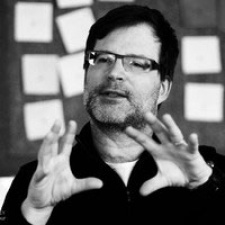Pocket Gamer Connects Helsinki 2019 will take place on October 1st to October 2nd. To give you a taste of what to expect, we'll regularly be publishing interviews with the speakers at the show.
For more details on PGC Helsinki and to book a ticket, head to the website here.
In this speaker spotlight, we chatted to Pascal Luban. Luban is a freelance creative director and game designer based in France. He has been working in the game industry as game or level designer since 1995, and has been commissioned by major studios and publishers including Activision, SCEE, Ubisoft and DICE.
In particular he was Lead Level Designer on the versus multiplayer versions of both Splinter Cell - Pandora Tomorrow and Chaos Theory, Creative Director on Wanted - Weapons of Fate, and lead game designer on Fighters Uncaged, the first combat game on Kinect.
The first triple-A title he worked on as lead game designer was Alone In The Dark - The New Nightmare.
His first game for mobile platforms, The One Hope, was published in 2007 by the Irish publishers Gmedia and has received the Best In Gaming award at the 2009 Digital Media Awards in Dublin. Leveraging his design experience on console and PC titles, Pascal is also working on mobile games. Recent mobile games he has been working on include Elite Pool Masters League, Tiny Cars and Airlines Commander.
Pascal is a regular contributor to Gamasutra and gives master classes to both schools and studios throughout Europe
At PGC Helsinki he'll be part of a panel session discussing Game Dev Life Lessons.
Pocketgamer.biz: Could you tell us a bit about your company?
Pascal Luban: I manage a company, The Game Design Studio, but I work freelance. I need the company for legal reasons but I have no staff.
What makes my 24 years experience unique is that I have always worked freelance, even when I was leading development teams and working on triple-A games. Of course, I was embedded in the teams and I was working on site but I never was an employee. This choice gave me the opportunity to work on nearly all platforms and genres, for a wide number of clients and I got practical experience in all design-related fields: Game mechanics, level design, economic design, game tuning, storytelling and playtesting.
As a result, I have developed a transversal vision of what it takes to make a good game.
Now, most of my activities are consulting-related. My clients, studios or publishers, contact me to assess games, suggest improvements and design specific parts of them. I also do high level training: Master classes and workshops on game design-related topics.
Why did you want to work in the games industry?
A long story that started when I discovered the CD-ROM.
What advice would you give to anyone looking to get into making games?
Be humble and be ready to question yourself. Our industry evolves all the time. One must always be on the lookout for changes in business models, players experiences, technologies, work processes and always be prepared to adapt.
What major trends do you predict in the next 12 months?
12 months is a bit short for major trends to have an impact on our industry. 3-4 years seems to be a better horizon.
This is my vision on major trends that will affect our industry over that horizon:
- The growing weight of hardware-agnostic games.
- The generalization of live games format for triple-A.
- The growing importance of quality storytelling in games where narrative will become a key component.
- The growing impact of senior gamers.
- The transformation of esport from gamers-focused to spectators-focused games.
- The rise of hybrid games, mixing physical activities and digital entertainment.
- The increased acceptance of user-generated content.
Which part of Pocket Gamer Connects Helsinki are you most looking forward to and why?
Conferences and unexpected meetings with people from all horizons.






















